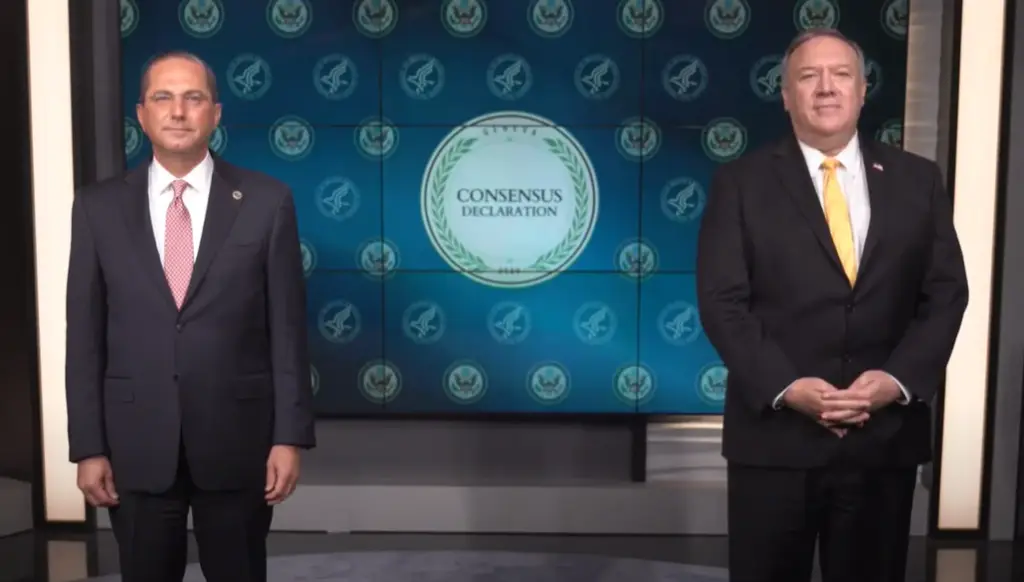WASHINGTON (BP) – The United States has signed with at least 31 other members of the United Nations a pro-life declaration decrying abortion and affirming the family unit and universal health coverage among other beliefs.
Brazil, Egypt, Hungary, Indonesia and Uganda joined the U.S. Thursday (Oct. 22) as co-signers of the Geneva Consensus Declaration, which is intended to signal to the U.N. the right of individual countries to support the sanctity of life without financial retribution or other coercion from other nations.
U.S. Secretary of State Mike Pompeo, who participated in the signing ceremony along with U.S. Health and Human Services Secretary Alex Azar, called the declaration “historic,” as the “first time that a multilateral coalition has been built around the issue of defending life.” He heralded the declaration’s cross-regional support from countries with a combined population of 1.6 billion people.
“With increasing frequency, some rich nations and U.N. agencies beholden to them are wrongly asserting abortion as a universal human right,” Azar said at the signing ceremony, which was held virtually. “These efforts pressure countries to institute progressive abortion laws or risk losing global funding or standing in international fora.”

Southern Baptist ethicist Elizabeth Graham said the declaration furthers a global effort supported by several nations to preserve life.
“The coalition certainly begins with a shared opposition to abortion, and this international pro-life effort helps create momentum for the pursuit of better healthcare standards for women and strengthening the family as foundational for society,” said Graham, vice president of operations and life initiatives for the Ethics & Religious Liberty Commission. “Every person across the globe, from the very beginning of life in the womb, is made worthy of immeasurable dignity in the image of God.”
While only 32 of the U.N.’s 193 member nations have signed the declaration to date, Azar said the statement “is a critical and useful tool to defend these principles across all United Nations bodies and at every multilateral setting using language previously agreed to by member-states of those bodies.”
“Tragically, women around the world unnecessarily suffer health challenges – all too often deadly health challenges – while too many wealthy nations and international institutions put a myopic focus on a radical agenda that is offensive to many cultures and derails agreement of women’s health priorities,” Azar said.
Among the six co-sponsoring nations, the U.S. and Hungary are the only countries where abortion is legal nationally with varying gestational period limits, according to the Center for Reproductive Rights, whose mission statement is fundamentally opposed to the declaration. Abortion is illegal in Egypt, and is available to save the life of the mother in Brazil, Indonesia and Uganda.
“At its very core, the declaration protects women’s health, defends the unborn, and reiterates the vital importance of the family as the foundation of society,” Pompeo said. “The declaration restates that ‘there is no international right to an abortion.’ It goes even further, affirming that every country has its own sovereign right to determine its own laws with respect to abortion. We say clearly, quote, ‘There is no international obligation on the part of states to finance or facilitate abortion.’”
The document, titled the Geneva Consensus Declaration On Promoting Women’s Health and Strengthening the Family, builds on an initiative Pompeo said the U.S. advanced in 2019 among likeminded nations to advance human dignity in the global public square.
“The result of that was that we delivered 20 of them to prepare a joint statement to decry pro-abortion language in UN documents. Together, these nations said clearly there simply is no international right to abortion,” Pompeo said. “Today, we’re taking the next step, as we sign the Geneva Consensus Declaration.”

Among nearly 15 core statements, the declaration affirms the importance of universal health coverage in achieving the declaration’s health goals, referencing a political declaration drafted at the 2019 United Nations General Assembly’s meeting on universal health coverage.
Other nations signing the declaration include Belarus, Saudi Arabia and Poland, the Washington Post reported. Azar and Pompeo have invited other nations to sign the declaration.

